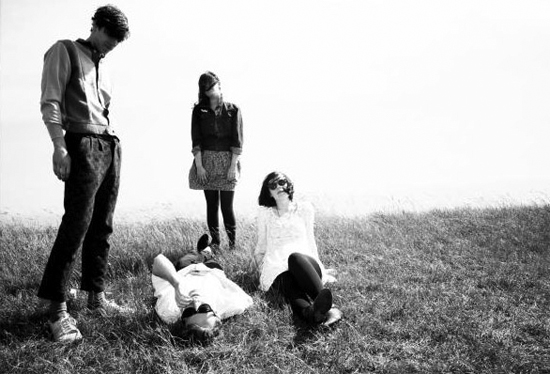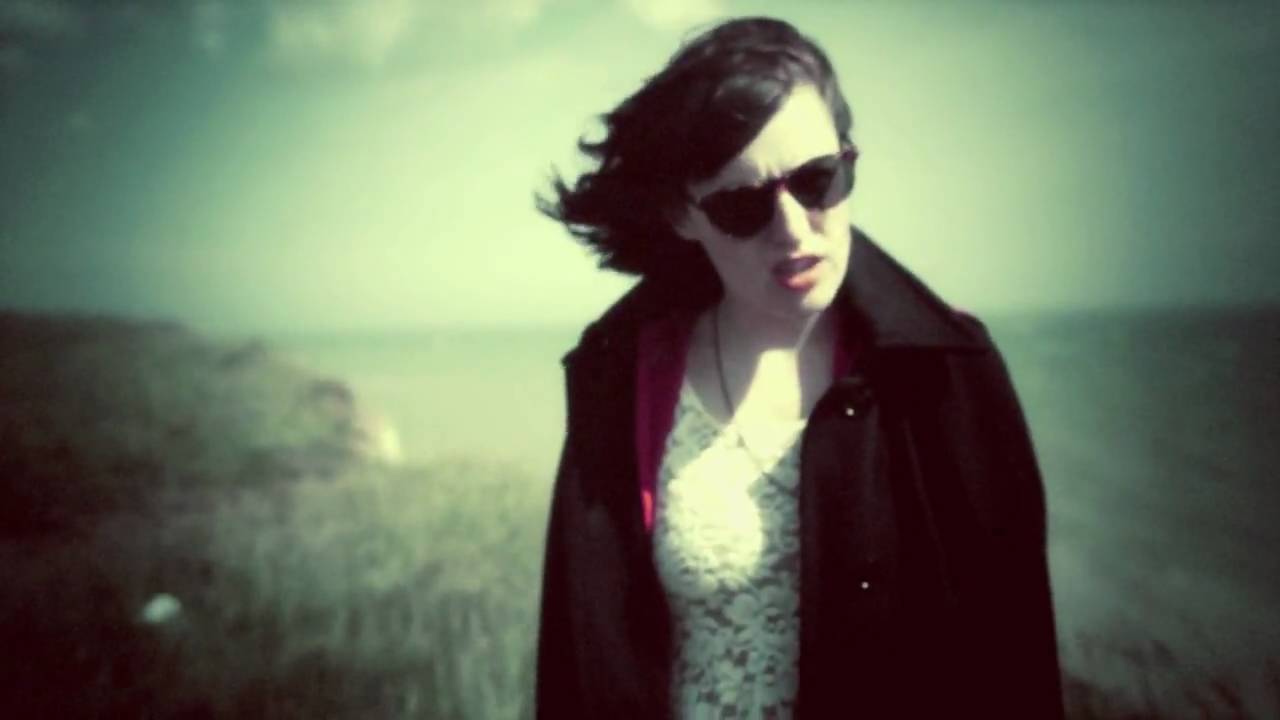It’s always a special day when something happens for the very first time in your life. I’m sat around a table with three quarters of Veronica Falls, when guitarist James Hoare stops, mid-sentence, and remarks “I like your shoes.” No one in my 41 years of existence has ever liked my footwear, even if said pair do resemble a couple of curled-up baby armadillos. “We appreciate a good shoe,” James continues, and I glow inwardly.
We are in a Hackney bistro-bar regularly frequented by musical types and Veronica Falls are in fine spirits. Their long-awaited, self-titled debut album is on the verge of release, and Hoare, drummer Patrick Doyle and bassist Marion Herbain (singer Roxanne Clifford cannot join us) exude a mix of relief and exhilaration. After an initial set of unsuccessful recording sessions, the band teamed up with Ash Workman earlier this year to thrash through the final version. The result is an album teeming with verve that allows the London-Glasgow quartet’s songcraft to shimmer amongst a backdrop of spiky indie pop.
But while talking to Veronica Falls over a bowl of rustic chips, they give the sense of a band wanting to right some misconceptions. Early singles ‘Found Love In A Graveyard’ and ‘Beachy Head’ gained both fans and lazy journalistic baggage. Almost every article included a reference to the band’s perceived gloominess, while the mere mention of the word ‘twee’ seems to (quite rightly) rankle. To dub Veronica Falls either twee or gloomy is to never have met them. An hour in their company is great fun – Hoare especially seems up for a laugh – while there is a steeliness about the three Veronicas not usually found in your average cardigan-donning, Pastels-listening fop. Veronica Falls is not an ethereal, wispy piece of lo-fi retro-schmooze – it is taut, tight and crackles with urgency. In the run up to its release this month we met up with them to chat about its protracted recording process.
Your debut album is now out. How was the birthing process?
Patrick Doyle: Well, we did it twice in the end. Originally, we recorded in a studio in Yorkshire just before Christmas last year and tried recording in a way we hadn’t tried before – by tracking everything. It didn’t really have any energy and it sounded a bit sterile. So, we did it all over again in London and we are way happier with it now; we wouldn’t have been happy to release what we had done in the other studio.
How soon did you know that the Yorkshire recording sessions weren’t right?
PD: I don’t think any of us had to listen to the recordings – we just knew instantly that it wasn’t working.
Marion Herbain: We knew it as we were doing it. We tried to kid ourselves and pretend it was okay.
PD: I don’t know about anyone else, but over the Christmas time [I started] to obsess over it. You think ‘Maybe they are just not very good songs’, but as soon as we started recording in London we listened back in the mixing room and it sounded way more like us. It gave me faith in the album again.
So, what was the problem with the original set of recordings?
James Hoare: We worked with [one producer] and it was totally his idea to track. It was 100 per cent not our idea, because we have only ever recorded live. Tracking suits some music, obviously. If you are doing Fleetwood Mac it is perfect. We are not, unfortunately. He was a bit older and was set in what he was going to be doing. That was a mistake of choice of producer. Second time around, we worked with Ash Workman in a studio in Wapping. He’s worked with a few people including Metronomy and The Drums.
PD: He’s really young and versatile. Obviously we don’t sound like Metronomy, but he managed to help us get our sound.
JH: We had invested quite a lot of time and money so when we knew we were going to redo it, we ended up re-recording everything in three days. It was all live, and as soon as we got a good take we moved on.
The album contains your early singles ‘Found Love In A Graveyard’ and ‘Beachy Head’. Is there a sense that Veronica Falls is about putting a line under your progress to date?
PD: Yes, the whole first year we were together, we just put out recordings as we did them. So, the first singles and then the album weren’t really separate things – they were just one body of work. It’s more like a document of the first year of the band. The next record will be quite a lot different.
MH: I think we wanted to get the album out so we could concentrate on writing new songs. It felt like we had playing these songs for about a year-and-a-half live and we just wanted to move on from it. That is why we were in [such] a hurry to bring out the album.
JH: There is quite a lot of pressure with a debut album. With singles, they sell but only to certain markets. You hope the album might reach people that haven’t heard the singles, so you want it to be an accurate representation. That’s why we were so worried with the first version, as for a lot of people the album might have been the first time they heard the band.
As someone who has never been in a band, I’m always fascinated by how new groups ‘decide’ on a sound. Did Veronica Falls have a set idea from the start of what you were trying to achieve?
PD: Not really. I guess everyone had their own individual idea of what they wanted it to be. That’s kind of what makes the band what it is. The best way you can write music is if each person brings their own things. I’d never played drums before until we started this band. Personally, I wanted the drumming to be as minimal as possible, as primitive sounding as possible, whereas someone else might have taken a different view. It’s about individuals and then hopefully something nice comes out at the end.
But if I asked you to draw a Venn diagram of your musical influences, what would be in the overlapping segment?
JH: REM, maybe. But definitely Velvet Underground from day one. From the moment we started playing we all liked the simplistic drumming style and the droney guitar.
While I can hear those bands in your sound, the press seems to have picked up on your supposed ‘dark side’. Has that become an annoyance?
PD: A bit. A lot of people say we are quite dark, but what they don’t pick up on is that we are quite tongue-in-cheek; that kind of goes over people’s heads.
JH: We want to distance ourselves from certain things, like being labelled as twee. What’s annoying is when people just look at the visual aspect. They will see some people wearing cardigans or a stripy shirt and because one of them is from Scotland they must be obsessed with Postcard Records. People have probably only heard 30 seconds of a song, but they labelled us as ‘twee and C86-obsessed’.
I think I’d find those people a bit intimidating; if they think you are twee then I cannot imagine what they view as hardcore.
JH: Yeah, it’s usually people who haven’t seen us live.
So, you have already alluded to a new set of songs. Have you a sense of how the Veronica Falls’ sound might develop?
JH: Yeah, we have got new songs that we are working on. Maybe it is a cliché to say that the next record is heavier, but it is different.
PD: It has just got a bit more bite to it. For a first record, as musicians, you are still learning to play together properly. We have definitely got to a point where we work really well together, when we’re writing and we are now more comfortable and better at our instruments. We know what sound we are going for.
Have you been listening to anything which might have infiltrated your songwriting?
PD: We’ve been listening to The Feelies quite a lot. We went on tour with Teenage Fanclub and, personally, I found that really inspiring.
And would you work with Ash Workman again?
PD: Absolutely. But I’d also love to go to America and work with the early REM producer, Mitch Easter. He’s just done the Big Troubles record.
And can we assume that Veronica Falls will always have a darker side to their music? Or could you make a record that sounds like something by Hal?
JH: There will always be darker elements; I don’t think it will be completely sunshine pop.
PD: It’s our sense of humour. The music doesn’t need to be about graveyards, but I think it will always have a gloominess.
Veronica Falls is out now via Bella Union.




